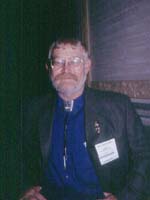
|
Features
|
|
|
|
Book Selections
|
|
Fun & Games
|
|
Contact Us
|
LARRY WEISHUHN
 EDITOR'S
NOTE: Larry Weishuhn is one of the nation's leading authorities on
deer management and deer hunting. He too has put in the hours required
to not only be a successful outdoor writer, but a successful outdoor celebrity.
As you read Larry's story, be sure and notice that the real secret to
his success was that he approached his craft as though it were a job,
and not merely a recreation. He's been highly successful and you can learn
much that will help you by studying his career.
EDITOR'S
NOTE: Larry Weishuhn is one of the nation's leading authorities on
deer management and deer hunting. He too has put in the hours required
to not only be a successful outdoor writer, but a successful outdoor celebrity.
As you read Larry's story, be sure and notice that the real secret to
his success was that he approached his craft as though it were a job,
and not merely a recreation. He's been highly successful and you can learn
much that will help you by studying his career.
Q: How long have you been an outdoor writer?
A: I sold my first national article in 1970.
Q: How did you get started?
A: I started out reading stories by Jack O'Conner and Warren Page.
Years ago, growing up out in the country as a little kid, I knew that's
what I wanted to do. But I'm also a wildlife biologist. I have spent a
lot of years working for the state of Texas, doing wildlife disease research,
specifically dealing with whitetail deer. I wrote a lot of technical papers
and saw a need for this technical information to be broken down for the
average guy to read. I've always had the desire to be a writer.
Q: What was your first sale?
A: I sold my first story to a publication called National Sportsman's
Digest, which dealt with desert big-horned sheep. At the time, I was working
with the desert big-horned sheep program in Texas.
Q: What was your first sale before a national
sale?
A: My first sale was that national sale.
Q: How did you develop your writing career?
A: While at Texas A&M University, I took a lot of Journalism and
English courses, which helped develop my writing skills. Then, I just
started writing and I found that the hardest thing to do was to sit down
in front of an old typewriter and begin producing. But writing has gotten
easier in the years since.
Q: What about rejection? Did you get any rejection
in the early days?
A: I got some rejection. I was also very fortunate because dealing
with white-tailed deer, I had gotten to know a lot of editors and worked
with a lot of writers, like John Wooders. He was very helpful in editing
manuscript for me. I was fortunate by knowing them and also having a reputation
as a wildlife biologist. I had done a lot of hunting, and as a result,
it was a lot easier to sell articles.
Q: I understand you had a lot of good mentors.
Tell me about the importance of mentors.
A: Having mentors is unbelievable. I am also a person who has studied
the works of Hemingway, and I learned that as a writer, you don't want
to develop the same style that other writers have. It's good to be able
to have a mentor to run ideas past. I would send manuscripts to mentors
who made a lot of corrections for me that helped in the long run. Having
a mentor is unbelievable, and there are a lot of benefits that come from
that.
Q: As an expert in the outdoor field, were you
able to use those credentials to turn your stories into more popular writing?
A: I've always been a firm believer that you should set a long-term
goal and build a solid base before going to the next level.
Q: What was your long term goal, and how did you
set your base?
A: My long term goal was to be where I am right now, writing for
numerous national magazines and television work. I set my base being that
I wanted to be known as a wildlife biologist. That's what I had the opportunity
to do, and that gave me the opportunity to meet a lot of different people.
I was able to come up with good sound information as far as writing about
hunting and biology.
Q: Would you say that if anyone has a particular
expertise in a particular field, he could use it as a stepping stone to
freelance writing?
A: Yes, and so many people need to do just that. They need to establish
themselves first, instead of jumping completely into writing. They need
to have a good solid basis. It also helps to have a good basis to fall
back on in case something goes wrong with your writing career.
Q: If you're an expert in any field, you can become
a writer?
A: I think that you can become a writer to a point, but there are
also a lot of communications that comes into effect. There are a lot of
guys I know who are experts in their fields, but they're not very good
writers. You need to have a certain ability to write and communicate,
regardless of whether or not you have a great background.
Q: What one tip would you give future writers?
A: To sit down and start writing. I've talked to a lot of guys
who want to be writers and do what I do. But it's important that they
start writing and start taking criticism from people who have been in
the field for a while.